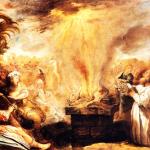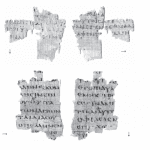When you find yourself apologizing for God’s demands, it is a good indicator that you ought to seriously examine your religious assumptions.
On the latest episode of The Handmaid’s Tale (as well as multiple others), several characters apologize before doing horrible things that they either think they have to, or want to but wish to use God as an excuse for.
Apologizing that one cannot call on the individual who used to be the best neonatalist in the country, because she is a woman and women are not allowed to be doctors in Gilead.
Apologizing for not allowing someone to see or hold their own baby.
Apologizing before taking off one’s belt and whipping one’s wife on her backside as “discipline” for not having obeyed her husband.
Blaming God for these things is telling. In essence, the person who does so is saying, “I’m sorry, but my God is not as kind, compassionate, respectful, inclusive, appreciative, and forgiving as I am.”
Let that sink in for a second.
I’ve commented on this before, but I think it is worth highlighting as part of the theological message of The Handmaid’s Tale.
There are countless television shows and movies that offer caricatures of one or both sides in the supposed divide between religious and atheist, progressive and conservative. The Handmaid’s Tale television series is thus quite remarkable because it doesn’t follow along with that. Indeed, it recognizes that the attempt to divide along such lines is itself a step on the path to Gilead.
The latest episodes would make a good starting point for introducing people to or expanding their understanding of intersectionality. All women are oppressed in this society, but handmaids more than wives. Those whose profession was cook or midwife are not restricted the way editors and doctors are with respect to the practicing of their profession, if they are women. And of course, even men are constrained at times by the evil system that they created. But they are also privileged, and the show provides opportunity for talking about that touchy topic, too.
Time and again, we saw in this most recent episode, how the humanity of people emerged from beneath the surface of imposed rules. The title of the episode, “Women’s Work,” was, I think, supposed to be a double entendre. The phrase has connotations of classic gender roles as defined in a patriarchal context. But the work of women in the episode is to undermine the system opposed upon them – even across divides of power and privilege that separate them in Gilead. That is what intersectionality is all about, in practice. Recognizing that the more privileged will try to divide those with less so as to keep them at odds with each other, fighting over the scraps thrown to them, rather than making alliance to bring about change.
Bob Cornwall wrote recently that “We cannot say that all lives matter until we who are white have acknowledged our privilege and have divested ourselves of it.” This led to an interesting conversation with a friend on Twitter. That exchange helped me to realize that this language of “divesting ourselves of privilege” may be unhelpful. It can feel like loss when one loses advantages one has. But surely we have in our innate humanity an ability to appreciate when others get the same rights and opportunities that we take for granted? And that is really what is meant.
And so if we apologize for our God, and/or our privilege, we are really making an excuse because we prefer not to change the system. It is never “just the way things are” or “just how God is,” but how we and our ancestors have made God and formulated a concept of God.
And so just as it is problematic to talk of God as less kind than we are, if society “requires” us to be unkind, then we need to take responsibility for remaking that which we ourselves as human beings have put in place.
Let me add here how much I loved the moment when June clicked the pen at the end of the episode before last, in a manner reminiscent of the triggering of an explosive device such as we saw in the episode that featured a suicide bombing. The show also addresses ethical issues about power, oppression, and terrorism – and whether the latter is appropriate as a last resort in fighting against an oppressive regime. Most Americans probably could not imagine ever supporting such actions. I wonder how most viewers feel about it when it happens in Gilead. And I wonder how many will rethink things that happen in other parts of the world, especially the Middle East, in light of their empathy with oppressed American women enslaved as handmaids.
Are you enjoying the theologically rich and provocative message of The Handmaid’s Tale?















